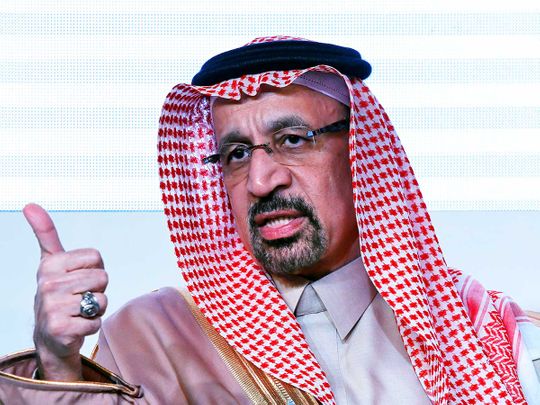
Saudi Arabia has removed Energy Minister Khalid Al-Falih from his position as Chairman of Saudi Aramco as the government prepares to sell shares in the state-owned oil company.
Al-Falih will be replaced by Yasir Al-Rumayyan, head of the sovereign wealth fund, a Saudi source said, speaking on condition of anonymity. The appointment of Al-Rumayyan, already an Aramco board member and key adviser to powerful Crown Prince Mohammed Bin Salman, intends to separate the Ministry of Energy from Aramco and avoid any conflicts of interest as the company prepares for the upcoming initial public offering, the source said.
Selling a stake in Aramco, which could be the world’s largest IPO, is a key part of Prince Mohammed’s plan to wean the Saudi economy off reliance on oil. Plans for the IPO were put on hold last year as Aramco focused on the $69 billion acquisition of a majority stake in a state chemical maker. The kingdom’s de facto ruler has said he expects Aramco to be valued at over $2 trillion, but analysts see $1.5 trillion as more realistic.
The IPO process accelerated after Aramco completed a $12 billion bond sale in April. International banks started pitching for a role on the IPO last week, people familiar told Bloomberg.
“I suspect they want to accelerate the IPO timeline,” said Helima Croft, chief commodities strategist at RBC Capital Markets. The Saudi authorities want to “bring a sense of urgency to the issue as this is a big signature initiative of Crown Prince Mohammad.”
The move to split oversight of Aramco from the Energy Ministry ends decades of tradition and further reduces Al-Falih’s portfolio after he lost the industry and mining functions in a government reshuffle on Friday. It also highlights the growing importance of the Public Investment Fund, which is set to receive proceeds from the Aramco IPO to reinvest both inside and outside the kingdom.
When he was first appointed energy minister in 2016, Al-Falih directed a U-turn in Saudi policy in the face of a U.S. shale boom and tumbling crude prices. He led the Organization of Petroleum Exporting Countries to agree to reduce output for the first time in eight years, starting in January 2017, and persuaded other big producers including Russia to join in the cuts. As the decrease failed to re-balance the market, Al-Falih organized extensions of the curbs, involving roughly 60% of the world’s oil output, through March 2020.
“All this shows that in Saudi Arabia there has been some dissatisfaction at the highest levels on how things have been going,” said Olivier Jakob, managing director at consultant Petromatrix GmbH in Zug, Switzerland. “Al-Falih has not really fully delivered on oil prices. He hasn’t delivered the price that’s required by the Saudi budget. There’s speculation that prices and the IPO are linked and they need higher prices to get the valuation they want for the IPO.”
The country needs crude to trade near $80 a barrel to balance its budget, according to research from the International Monetary Fund and Bloomberg Intelligence. Brent crude was trading at $58.75 a barrel at 3:50 p.m. in London. It also needs higher oil prices if it’s to achieve a valuation at least close to what Prince Mohammed set as a target.
To bolster prices, Saudi Arabia has cut production to less than 10 million barrels a day as part of its agreement with the Organization of Petroleum Exporting Countries to limit output. Al-Falih helped broker the deal that brought other producers like Russia into the effort to balance markets by curbing production. The Saudis are doing most of the heavy lifting to support the deal, pumping about 500,000 barrels a day less than they pledged.
Al-Rumayyan, a former banker with Saudi Fransi Capital, is governor of the PIF, as the sovereign fund is known, leading it’s transformation from a sleepy domestic holding company into one of the biggest investors in global technology start-ups. The fund has accumulated stakes in electric carmaker Tesla Inc., ride-sharing company Uber Technologies Inc. and has made a $45 billion commitment to SoftBank Group Corp.’s $100 billion technology fund.
The kingdom’s original plan, announced by Prince Mohammed in 2016, was to sell about 5% of Aramco on the Riyadh exchange and at least one international bourse. The listing was pushed back to 2020 or 2021 to allow Aramco to complete the $69 billion acquisition of Saudi Basic Industries Corp.












